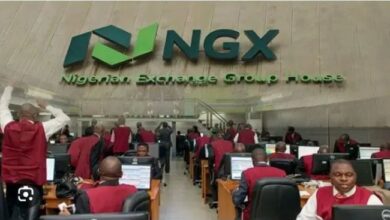Okonjo Iweala, The Failed Minister
Dr. Ngozi Okonjo-Iweala, Nigeria’s Minister of Finance, is bowing out of office with the economy worse than she met it
As their members battle with hunger and inability to meet up with their basic obligations as a result of backlog of unpaid wages, Nigerian labour leaders indicated last week that they may have no other option than to ask workers to stay at home. Another round of industrial crises appears to be looming.
But as harrowing as the tales of the unpaid wages, especially of civil servants, teachers, doctors and others employees in the public service whose salaries even when regularly paid can barely take them home is, it is doubtful if the resort to industrial action can force a significant change in the salary crises. For one, most of the state chief executives have indicated that the remedy for rectification of the default in the payment of salaries and other emoluments of workers is beyond their powers.
The Governors, especially those elected on the platform of the All Progressives Congress, APC repeated their incapacitation on the matter of salaries during a visit to General Muhammadu Buhari, Nigeria’s President-elect early this month in Abuja.
“One of the issues that became of concern to all of us is the really bad shape of the Nigerian economy. We have come to notify the incoming president of the challenges ahead of him. As it stands today, most states of the federation have not been able to pay salaries and even the federal government has not paid April salaries and that is very worrisome. By May and June, the unpaid salaries will be in cumulative of three months,” Rochas Okorocha, Chairman of the Progressives Governors’ Forum, PGF who led his colleagues to the meeting with Buhari told journalists at the end of the meeting. He pleaded with the President-elect to consider implementing bailout measures that could at least, enable them meet their salary obligations to workers.
Dr. Ngozi Okonjo Iweala, the Minister of Finance and the Coordinating Minister for the Economy, did not find funny the claims by the Governors that the “bad shape” of the economy was responsible for their inability to pay wages. Indeed, going by her subsequent reactions, Okonjo-Iweala who had before now painted a rosy picture of the economy, despite all indications to the contrary, considered the claims by the Governors a direct attack on her management of the financial system in the past four years.
According to her, the claim by the APC governors-elect that they have been unable to pay salaries because the President Goodluck Jonathan administration has mismanaged the economy was wrong. Rather, she located the problem in the lack of prioritization.
The Minister also affirmed that Staff salaries at the federal level were up to date, as workers had received their April salaries. However, in the chest thumping dismissal of the claims of the governors, the Minister failed to tell Nigerians that the Federal Government itself has had to borrow from the banks to be able to pay its workers.
Okonjo-Iweala revealed later to journalists in Abuja that the Federal Government itself has been hemorrhaging in meeting salary obligations and that it has been doing so through massive borrowing. Shockingly, she revealed that more than half of the budgetary provisions for borrowing in 2015 have been used in the first four months to pay salaries and provide funds for overheads.
“Of the N882 billion budgetary provision for borrowing, the government has borrowed N473 billion to meet up with recurrent expenditure, including salaries and overheads. No capital release so far.” And like the Governors, she attributed the situation to the decline in revenues accruing to the coffers of government as a result of the fall in the price of oil.
This, according to Senator Abiola Ajimobi, the Governor of Oyo State, was unnecessary equivocation on the part of the Minister. Festus Adedayo, the special adviser (media) to the Governor said the fall in the allocation accruable to the states was responsible for the financial challenges being faced by states just as it is being experienced by the Federal Government. As he pointed out, allocations to state governments had generally reduced by 50 per cent while the Oyo State government which used to collect about N4billion now receives about N2 billion monthly, while it has salary obligation of about N5.3 billion. This, he said has made it difficult for the State to continue with its tradition of paying its workers on or before 26th of every month as it used to do.
Beyond the Federal and state governments playing ping-pong with workers, analysts pointed out that while the Federal Government has access to borrowing from banks to meet its obligations through different financial instruments, the state governments have not been availed of such opportunities. Indeed, the Federal Government has, through the minister, discouraged banks from lending to states regardless of the purpose of loan.
Analysts also posited that while the minister gleefully said the Federal Government has not released any capital budget this year, the states may not be able to go through the same route due to competing demands from their people. “What is at stake here is the reputation of the federal government’s financial managers. While states could have done much better than they have done to lessen the problem of the cash crunch on their people, the federal government has not placed the country on financial ‘war footing’ partly because their laxity has brought the country nearly to its knees,” said Idowu Akinlotan, a columnist with The Nation newspaper.
He also pointed out that beyond the drop in revenues from the sale of crude oil, the dire financial situation facing the country could be attributed to waste of national resources, mismanagement and corruption, including unlawful election spending and bizarre and unexplainable fuel subsidy payments. “The minister of course cannot offer any explanation for these. She assumed it was enough that a cash crunch problem already existed, which states should take for granted and mitigate by forsaking all other priorities,” said the columnist who also feared that with the rate of borrowing, there are no guarantees that the Federal Government will not exceeded its loan budgetary projections by the end of the year.
The financial challenge being experienced in the country has led to fresh queries on the reputation of the country’s financial managers. And no one is more under focus than Okonjo-Iweala, the World Bank ‘financial expert’.
She came into the office in 2011 promising to turn around the economy and was even named Coordinating Minister of the economy, a position that does not exist in Nigeria’s constitution.
Under her watch, Okonjo-Iweala forced Nigeria to create a Sovereign Wealth Fund of $1billion, a novelty in a country that has always consumed all its oil income, leaving nothing for the future. She also re-introduced some transparency in public finance, by publishing the monthly allocations going to all tiers of government.
However, she has been unable to tame the bigger monsters. Under her watch, the combined domestic and external debt of the Federal Government ballooned to $40 billion by the end of 2014. Abandoned capital projects also litter the country with completion costs estimated at over $50 billion. Some of the projects include the Lagos-Ibadan Expressway, Shagamu-Benin Expressway, the second Niger Bridge, the East-West Road and many others. Contractors in many sites have left and have sacked thousands of workers.
The woman styled as the co-ordinating minister has watched helplessly as the Federal Government indulged in a series of financial recklessness, such as the wasteful National Conference that gobbled over N10 billion and the establishment of new Federal universities when the existing ones are poorly funded. Such is the pattern of reckless expenditure that at the moment, Nigeria’s foreign reserve has dropped to $29 billion, from the $43 billion met by the Jonathan administration.
After oil prices crashed last year, there was expectedly global concerns that Nigeria was going to be seriously affected and that the national economy, rebased to be Africa’s biggest, was going to shrink. To justify public expectation, she has continued to bamboozle Nigerians about the good health of the economy, by painting a rosy picture of the economic situation, even when other experts saw a picture bleak and gloomy.
Despite her distorting picture, what many Nigerians, including leading members of APC who are gearing to take over power on 29 May know, is that the economy has been so mismanaged in the past four years that Major General Muhammadu Buhari, (retd), the President elect will virtually inherit an empty treasury when he assumes office.
Buhari himself knows his new government would be ranged against Mount Everest financial odds when he assumes office. He told a delegation of visiting Northern elders that his emergence as president came at “the wrong time” due to the enormous challenges his administration would face. “You can imagine what is happening in the high seas where up to 400,000 barrels of crude oil which we rely on is stolen everyday with the full cooperation of those who are supposed to protect it. The price of oil has gone down and 90 per cent of the foreign exchange we rely on comes from that. So, you have to convince your constituencies that we have virtually arrived at the wrong time and that they have to temper their expectation,” the President-elect said.
Last week, Nigeria Bureau of Statistics sounded the economic decline louder when it released new data. The data showed that the country’s real Gross Domestic Product, GDP growth rate further declined to 3.86 percent in the first quarter of 2015 compared to 5.94 percent the previous quarter. NBS also indicated that the Consumer Price Index, CPI which measures inflation rose further to 8.7 per cent in April compared to 8.5 percent in March while the country’s GDP growth rate was lower by 2.25 percent points from the preceding quarter and by 1.98 per cent from the corresponding quarter of 2014.
Read the full story at: http://thenewsnigeria.com.ng/2015/05/18/okonjo-iweala-the-failed-minister/













